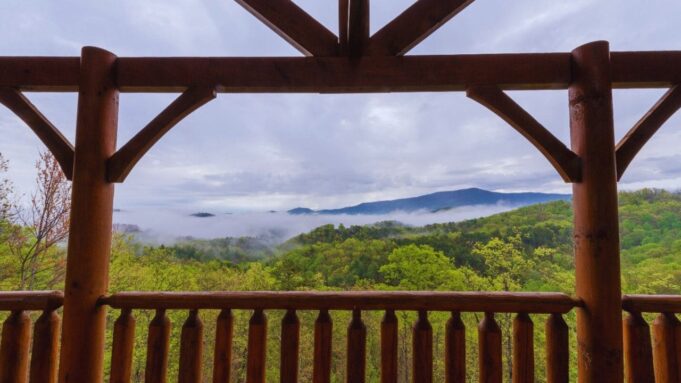Slower travel gives you space to step outside your usual pace. You’re not racing through traffic or staring at a screen, and there’s no packed agenda waiting for your attention. Instead of rushing through moments, you begin to move through them with more awareness. You notice the way your body feels, the rhythm of your thoughts, and how different it all becomes when life isn’t speeding by.
That sense of awareness deepens in the Smoky Mountains. The pace feels quieter but not empty. Whether you’re walking through a shaded trail or just watching the fog roll across a ridge, the stillness is easy to fall into. Everything slows down naturally, and in that space, you start to notice more about your surroundings and yourself. It’s the kind of setting that invites reflection without asking for it.
Calm Without Distraction
When the usual noise disappears, your mind starts to settle differently. There’s no pressure to answer messages, no alerts pulling your focus, and no constant activity to keep up with. In that quiet, you find out what actually helps you relax. It might be a morning cup of coffee on a porch, a walk without your phone, or just sitting with your thoughts for a few minutes. Without distractions, calm becomes something you experience fully, not something you chase.
Where you stay plays a huge role in this. Cabins give you a private space to let go of the usual demands of travel. You’re not walking through lobbies or sharing space with strangers—you have your quiet spot in the woods or on a hillside. Cabins with indoor pools add another level of peace and comfort, letting you relax on your terms regardless of the weather. If you’re looking for a place that supports that kind of experience, Large Cabin Rentals is a great option. Their cabins are spacious, well-located, and thoughtfully designed, giving you a calm environment that’s easy to settle into.
Energy Away from Noise
You don’t realize how much constant noise shapes your energy until you step away from it. The hum of traffic, phone alerts, background conversations, and all the things we’re used to tuning out still affect how we feel. Once that noise is gone, your body starts to respond differently. Your breathing shifts, your muscles relax, and your head feels a little clearer without the usual clutter.
In a mountain setting, you feel that difference more quickly. Mornings are quieter, and nights are deeper, and even the sounds—wind through trees, birds, distant water—feel less demanding. You might find yourself sleeping more deeply or feeling more rested, even with fewer hours of sleep. That kind of shift says something about how your energy works when it’s not being pulled in every direction.
Needing Less Than You Thought
Modern life makes it easy to believe that more stuff equals more comfort. But when you spend time in a quiet outdoor setting, that idea starts to fade. You realize that you don’t need ten different things to feel content. A warm meal, a soft place to sit, and good light might be all it takes to feel fully at ease.
This change isn’t forced—it happens naturally when you’re away from excess. Without malls, menus, or routines reminding you what you “should” want, you start to reconnect with what’s actually useful and comforting to you. Maybe it’s a simple blanket, a small book, or a quiet space to write or think. Discovering that contentment doesn’t come from having more but from having what feels right at the moment is a shift that stays with you even after the trip ends.
Thoughts Off the Grid
Being out of signal range sounds like a hassle until you’re there, and then it feels like a relief. There’s no need to check anything, post updates, or respond right away. Your mind has fewer demands pulling on it, so it starts to wander instead of reacting. That mental quiet makes room for thoughts that normally get pushed aside.
In a slower setting, those thoughts often come with more clarity. You might start thinking about a decision you’ve been putting off or a project you keep meaning to start. You might notice things you’ve been avoiding or finally take a deep breath without multitasking.
Discomfort Without Rushing
Slow travel often brings a little discomfort, and that’s not always a bad thing. It might be a hike that takes longer than expected, a night that feels too quiet, or a day where things don’t go quite as planned. In those moments, your first instinct might be to fix it or speed through it. But when you’re not in a rush, you learn how to sit with the discomfort instead of pushing it away.
That experience teaches you how to stay present even when things aren’t perfect. Instead of reacting quickly or moving on, you notice how you cope and what helps you stay grounded. You stop trying to distract yourself or change the feeling right away. You learn to breathe through it, adjust your expectations, and accept that some parts of travel, just like life, are about moving through uncomfortable moments, not avoiding them.
Beauty That Holds Attention
Mountains offer a different kind of beauty. It’s not flashy or fast. It’s slow, quiet, and sometimes subtle. A ridge line at sunset, fog rising through trees, or the sound of wind moving through leaves—these aren’t things you glance at once and move on. They hold your attention in a way that feels rare and honest.
When you slow down, you start noticing which details you’re drawn to most. Maybe it’s the shifting colors of the sky or the texture of a worn trail under your boots. That kind of attention tells you something about how your mind works when it’s not overwhelmed.
Adapting to Simple Routines
In the mountains, daily routines tend to slow down. Meals are less rushed. Sleep comes earlier. Your day might revolve around a walk, a quiet view, or a slow stretch with coffee. And in those moments, you start to notice how calming a simple routine can feel.
You begin to enjoy the rhythm of easy, repeatable things. That experience makes you think differently about what you consider “productive” back home. Maybe it’s not about squeezing more into your day. Maybe it’s about giving space to a few things that matter.
Slow travel in the Smoky Mountains shows you more of yourself. You learn how you feel without constant input, how you move without deadlines, and how you think without pressure. You come back with more than photos or souvenirs. You return with a better understanding of what brings you peace.















